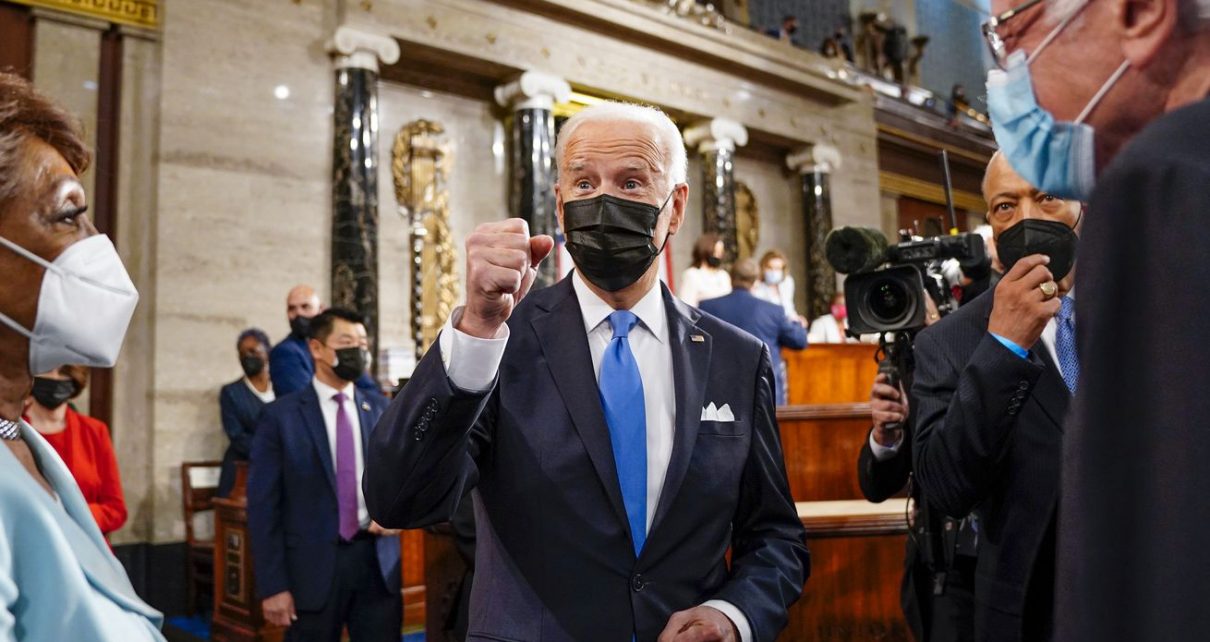
Progressives believe they helped push for a quick ceasefire in Israel-Gaza. Will they do more?
As the Israel-Gaza war raged, President Joe Biden made clear to Israeli Prime Minister Benjamin Netanyahu that there was a problem.
Full-throated support for Israel among Democrats was waning, namely because of progressives. Among the clearest signs were moves in the House and Senate to block a $735 million weapons sale to Israel, which only weeks earlier Democratic congressional aides said they hadn’t considered controversial or even noteworthy.
On May 19, about nine days into the conflict, Biden told Netanyahu that unless he wanted to risk losing bipartisan support for Israel in Congress, he “expected” the Israeli premier to wind down the fight. The next day, Israel and Hamas agreed to a ceasefire.
Progressives in and out of government say their actions both pressured Biden and gave him a convincing talking point in conversations with Netanyahu. “Progressives deserve a little credit for the ceasefire,” said Ben Rhodes, a former top national security aide to President Barack Obama and an outspoken advocate for a more progressive foreign policy. “Biden was looking over his left shoulder and told Netanyahu, ‘You have to move on this.’”
The true extent to which progressives directly played a role in ending this round of Israeli-Palestinian fighting is unclear. The administration insists no members of Congress changed Biden’s mind during the conflict, and the president openly stated last week that “my party still supports Israel.”
But what is clear is that progressives no longer play a fringe role in the American national security discussion. They’re a real force, and their time is now.
“Looking at where this debate was 10 or even five years ago and where it is now, I think we can’t help but be encouraged,” said Matt Duss, Sen. Bernie Sanders’s national security adviser and a leading figure of the progressive foreign policy movement.
Biden’s presidency gave progressives a clear opportunity
Progressives have made their voices heard on foreign policy throughout US history. From the Wilsonian era to the Vietnam and Iraq wars, they’ve long pressured American leaders to avoid conflicts abroad and focus on economic and social issues at home.
The current progressive movement upholds those ideas and also places primacy on tackling climate change and promoting human rights while curbing support for authoritarian regimes.
The problem is that it didn’t have much success swaying either the Obama or Trump administrations.
Obama didn’t end the war in Afghanistan, for example, and supported Israel’s bombing campaign during the previous Israel-Hamas fight in 2014. “I think that undercut us with respect to human rights, and it didn’t help us make any progress on the Israeli-Palestinian issue,” Rhodes told me.
/cdn.vox-cdn.com/uploads/chorus_asset/file/22540889/456461420.jpg) Win McNamee/Getty Images
Win McNamee/Getty ImagesAnd though President Donald Trump shared some of the antiwar tendencies of progressives, namely not initiating long wars in the Middle East, he ignored all left-leaning advice while cozying up to dictators, minimizing human rights, calling climate change a “hoax,” and exacerbating racial tensions at home.
But progressives did achieve one moral victory with Trump in office. After years of trying and failing, in 2019 Congress passed a resolution, spearheaded by progressives such as Sanders and Rep. Ro Khanna (D-CA), to end US support for the Saudi-led war in Yemen, though Trump vetoed it. Still, it proved progressives could have a serious impact on the broader national security debate.
“The Yemen success was important and it gave momentum to the whole movement,” said Tommy Vietor, a former Obama White House official and now co-host with Rhodes of the left-leaning foreign policy podcast Pod Save the World.
Biden’s rise, though, was a boon to the progressive foreign policy movement.
Since the campaign, Biden’s team has remained closely connected to progressive climate, veteran, and other groups to hear their views on myriad national security issues. They’ve helped influence some of the president’s decisions, such as ending most offensive support for the Yemen war, withdrawing all US troops and contractors from Afghanistan by September 11, treating climate change as the top global threat, and waiving intellectual property protections for US-made Covid-19 vaccines.
That’s not to say the president is pursuing a purely progressive foreign policy, or that progressives are entirely pleased with him. “The left thinks it’s getting a raw deal from Biden on foreign policy generally,” said Van Jackson, a former Obama-era Pentagon official now at the Victoria University of Wellington in New Zealand. That perception, he said, has to do with Biden tying domestic issues to competition with China and resisting making deep cuts to defense spending.
Still, Jackson acknowledges, “there is a greater opportunity to influence policy from the left than any time since I’ve been alive.”
But privately, progressives share their concern that their wins so far came in areas where Biden already agreed with them. On the campaign trail, Biden said he would end “forever wars” and focus his attention on motivating the world to confront climate change.
The real test would be when progressives and Biden differed on a major issue. Then came the Israel-Gaza war.
The progressive pushback on Israel proved their staying power
Following weeks of aggressive and at times violent Israeli actions toward Palestinians in Jerusalem, the militant group Hamas launched rockets at Israel on May 10. Israel responded with devastating airstrikes and artillery fire on the group’s positions in Gaza.
The disparity between the two sides — Hamas has thousands of imprecise rockets while Israel has one of the world’s strongest militaries and most effective missile defense systems — meant it wasn’t a fair fight. Before a ceasefire ended the nearly two weeks of fighting, Israel had killed nearly 250 Palestinians, including 66 children, while Hamas had killed 12 Israelis, including two children.
/cdn.vox-cdn.com/uploads/chorus_asset/file/22540895/1233115089.jpg) Mahmud Hams/AFP via Getty Images
Mahmud Hams/AFP via Getty ImagesBiden, as he has throughout his career, backed Israel’s “right to defend itself” while initially saying very little about the plight of the Palestinians. Progressives countered the president, saying support for Israel could and should be coupled with defending Palestinian rights.
Among the most vocal critics was Rep. Rashida Tlaib (D-MI), the first Palestinian American woman to serve in Congress. On May 13, she gave an impassioned speech on the House floor about the suffering of Palestinians in Gaza and the West Bank and why the US should reconsider its unconditional support of Israel.
“When I see the images and videos of destruction and death in Palestine, all I hear are the children screaming from pure fear and terror,” she said, holding back tears. A statement from a Palestinian mother she read about putting her kids to bed during the bombings “broke me a little more because … my country’s policies and funding will deny this mother’s right to see her own children live without fear and to grow old without painful trauma and violence.”
Five days later, Tlaib confronted Biden on a Detroit tarmac during the president’s visit to a Ford electric vehicle center and spoke to him quietly for eight minutes.
“Palestinian human rights are not a bargaining chip and must be protected, not negotiated,” a Tlaib aide said to NPR that day. “The US cannot continue to give the right-wing Netanyahu government billions each year to commit crimes against Palestinians. Atrocities like bombing schools cannot be tolerated, much less conducted with US-supplied weapons.”
In a speech at the Ford center after their conversation, Biden addressed Tlaib directly, saying: “I admire your intellect, I admire your passion, and I admire your concern for so many other people.”
“From my heart,” he continued, “I pray that your grandmom and family are well. I promise you, I’m going to do everything to see that they are, on the West Bank. You’re a fighter. And, God, thank you for being a fighter.”
And Tlaib did keep fighting. In response to reports that the administration had approved the sale of $735 million in precision-guided weapons to Israel, Tlaib and two other progressives, Reps. Alexandria Ocasio-Cortez (D-NY) and Mark Pocan (D-WI), put forward a resolution on May 19 to block the transaction.
The next day, May 20, Sanders filed his own resolution with the same goal in mind. And by May 21 in Israel, Israel and Hamas agreed to a ceasefire, with some crediting the congressional pressure for ending the fighting after just 11 days.
US officials, including previous presidents from both parties, had sought to condition aid to Israel before. But to consider doing so while Israel engaged in a war with Gaza was different, and underscored the shift in Washington.
“The politics of Israel have changed,” said Rep. Joaquin Castro (D-TX), a progressive House Foreign Affairs Committee member. “People are standing up for what they believe, to be fair, but also to speak out against injustice, and I’ve seen many of my colleagues do it sincerely.”
The question now is if the progressive momentum can be sustained.
Foreign policy progressives are getting wins. Can they keep winning?
Progressives make three main arguments for their recent success and why they believe they’ll remain a force in years to come.
The first is that Trump’s disregard for human rights and relationships with autocrats like Saudi Arabia’s Crown Prince Mohammed bin Salman and right-wing leaders like Netanyahu brought disparate progressive factions together.
“The Trump years gave the progressive community time to formulate what their ideas really were,” said a senior House Democratic aide, who spoke on the condition of anonymity because they weren’t authorized to speak to the press.
Progressives expect the misbehavior of foreign leaders to continue, providing endless fodder for their case. Netanyahu, for example, “is all about short-term, Pyrrhic victories and he’s fucking himself in the long run,” said Vietor, the progressive podcast host.
The second is that the ubiquity of social media will continue to broadcast atrocities around the world. That will allow progressives to unite around whatever injustice goes viral online and then do something about it.
“The burden of knowing, and being faced with reality, is acting on that reality you’re aware of. That wasn’t true for generations,” said Castro. “Now you’re faced with the facts and you have to govern accordingly.”
/cdn.vox-cdn.com/uploads/chorus_asset/file/22540902/1227542528.jpg) Michael Noble Jr./The Washington Post via Getty Images
Michael Noble Jr./The Washington Post via Getty ImagesAnd the third is that the progressive ranks in government keep swelling. “Progressives are saying things about foreign policy interests and values that a lot of Americans believe in and agree with, and have for a while,” said Duss, the Sanders adviser. “Thanks to years of hard organizing and policy work, there are more and more people in Washington who reflect those views.”
New progressive voices keep arriving. In one 2020 election result that many saw as a sign of the times, Jamaal Bowman defeated pro-Israel House Foreign Affairs Committee Chair Eliot Engel in New York.
During the Israel-Gaza fight, now-Rep. Bowman put out a statement that was far more sympathetic to Palestinians than anything Engel likely would have offered. “It is imperative that the United States have an even handed approach and ensure our nation is not complicit in stoking the flames of conflict through continued settlement expansion and home demolitions that undermine the two-state solution, perpetuate endless occupation, and threaten the long-term security of both Israelis and Palestinians,” Bowman said on May 11.
More support in the capital gives progressives like Sanders, Ocasio-Cortez, and Tlaib even more political space to push their views and challenge Biden from the left.
But experts wonder what will happen if the progressive foreign policy movement becomes too successful.
One possibility is that receiving more attention and notoriety could force progressives to concretize and homogenize their views. “The risk of movements becoming more institutionalized is they lose their radical edge,” said Marie Berry, an associate professor at the University of Denver.
And what if the movement becomes so successful that some of its proponents become the national security adviser, defense secretary, secretary of defense, or even president? That, ironically, could be a problem.
“When you have to make hard choices about what you care about, things are going to get messy very fast,” said Josh Shifrinson, an associate professor at Boston University. And if a progressive finds themselves in the Oval Office, the problem will be that “you’re no longer the leader of the progressive movement, but the leader of US, which requires different choices, priorities, and thinking.”
The progressive foreign policy movement will have to contend with those risks as it moves from the wings to center stage. But for now, their perceived successes during the Israel-Gaza crisis will likely keep them in the spotlight.
“It will give us more confidence to conduct more foreign policy from the House and Senate,” said Khanna, one of the leading progressive lawmakers. “The voice of members of Congress can make a huge difference in standing up for human rights and for peace.”





